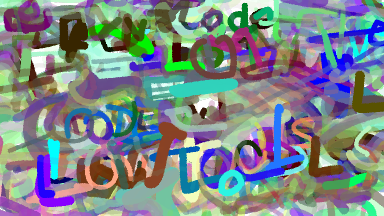Every day, businesses are looking for new and innovative ways to improve their productivity. And with the ever-growing demand for mobile apps, many companies are turning to low-code app development platforms to help them create custom business applications quickly and easily. So what is low code, and why is it becoming such a popular choice for business app development? Keep reading to find out.
What is low code?
Low-code platforms provide a way to develop applications with less coding and fewer technical resources than traditional application development. Low-code platforms are often used for building business applications, as they can be easily configured to fit specific business needs without a lot of custom coding.
How low-code will boost your efficiency by saving you time and money
Low-code platforms are becoming more present and important in the business world. They are replacing simple reporting tools because they are faster, easier to use, and more efficient. Low-code platforms allow you to create applications without any coding experience. This means that you can build your applications quickly and easily, without having to learn a new coding language. Low-code platforms also allow you to reuse existing code and templates, which speeds up the application development process even further.
Also, these platforms are becoming more popular because they offer businesses a way to save time and money. Businesses can use low-code platforms to create custom applications without having to hire a team of developers. This means that businesses can get their applications up and running quickly and easily, without spending a lot of money. Additionally, businesses can use low-code platforms to improve their workflow by automating tasks and processes. Automation can save businesses time and money, making low-code platforms an essential tool for businesses of all sizes.
How many low-code platforms are there on the market?
There are several low-code platforms available, including Oracle Apex, Mendix, OutSystems, and Appian. Low-code platforms provide a way to quickly develop applications with fewer technical resources than traditional application development.
What are the benefits of using a low-code platform?
Low-code platforms offer a number of benefits, including:
- Reduced development time and costs: Low-code platforms enable businesses to develop applications faster and cheaper than traditional methods.
- Increased agility: Low-code platforms make it easy to make changes and iterate quickly, allowing businesses to respond quickly to changing needs.
- Improved user experience: Low-code platforms often come with prebuilt templates and components that make it easy to create high-quality user experiences.
What sets some of them apart from the competition?
Oracle Apex, Mendix, and Appian are all leading low-code platforms. Oracle Apex is a particularly good choice for businesses that want to develop Oracle-based applications, as it offers native Oracle database support. Mendix is a good choice for businesses that want to develop cloud-native applications. Appian is a good choice for businesses that want to develop highly complex applications.
Results show that the main benefits are:
Oracle Apex:
- Allows for rapid application development
- Unrivaled security features
- Robust developer tooling
- Fully supports Oracle Database technologies
- Quick API Integrations against other systems
Mendix:
- Greater flexibility and freedom in design
- A focus on collaboration and social features
Appian:
- An intuitive interface that makes it easy to build process-driven applications
- The ability to model business processes as well as data together in a single system
- A comprehensive set of out-of-the-box functionality
What infrastructure do you need to use Oracle Apex?
Oracle Apex runs on top of Oracle Database, so you will need an Oracle Database license to use Oracle Apex. Oracle Database is available in several editions, including Oracle Database Standard Edition, Oracle Database Enterprise Edition, and Oracle Database Express Edition.
With Oracle Apex, you can build applications using only a few clicks, without having to write any code. Oracle Apex provides a complete set of tools for developing and deploying web-based applications.
What can I do to start using Oracle Apex?
If you’re interested in using Oracle Apex to develop applications, there are a few things you can do to get started. First, you’ll need to download and install Oracle Apex. Oracle Apex is available for free from the Oracle website. Once you have Oracle Apex installed, you can begin developing your applications.
If you’re not familiar with Oracle Apex, or if you’re not sure how to get started, there are several resources available to help you. The Oracle website provides some tutorials and guides that can help you get started with Oracle Apex. In addition, there are a number of online forums and websites dedicated to Oracle Apex that can provide you with support and guidance.
Oracle Apex is a powerful low-code development platform that can help you build enterprise applications quickly and easily. With Oracle Apex, you can get started developing your applications without having to write any code. Oracle Apex also provides several features that make it easy to deploy and manage your applications.
The architecture of Oracle Apex
In short, the architecture is a three-level system that has a presentation level, an application level, and a database level.
The presentation tier is the interface between the user and the Oracle Apex application. The presentation tier contains the Oracle Apex Application Server, which is responsible for processing user requests and generating responses.
The application tier contains the Oracle Apex Application Builder, which is used to develop Oracle Apex applications. The application tier also contains the Oracle Apex Listener, which is responsible for deploying Oracle Apex applications.
The database tier contains the Oracle Database, which stores the data for Oracle Apex applications. The database tier also contains the Oracle Application Express Engine, which is responsible for processing Oracle Apex applications.
If you’re curious about how Oracle Apex can help you develop applications quickly, we would be more than happy to chat with you and answer any of your questions.
Follow us for more posts!



